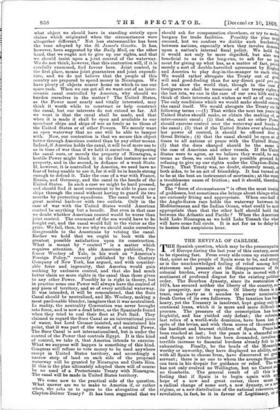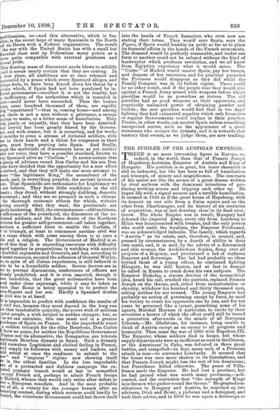THE REVIVAL OF CARLISM. T HE Spanish question, which may be
the preoccupatio of Europe during the last year of this century, seem to be ripening fast. From every side come up statemen that, quiet as the people of Spain seem to be, and strop as is the unacknowledged feeling of relief among bo statesmen and peasants at the disappearance of tb colonial burden, every class in Spain is moved with sentiment of profound disgust for the existing politi order. The Bourbon dynasty, since its restoration 11 1874, has secured neither the liberty of the country, not its prosperity, nor its repute. Of liberty there isnc trace, each party as it accedes to power nominatin fresh Cortes of its own followers. The taxation has bees heavy, yet the Treasury is insolvent, kept going only bl continual loans, which it is more and more difficult to procure. The pressure of the conscription has bees frightful, and has yielded only defeat ; the coloniss, last relics of a world-wide dominion, have been lost is spite of the levies, and with them scores of thousands o the hardiest and bravest children of Spain. Peace bas been reached at last ; but the peace is a shameful one, and though no tribute has been demanded, involves terrible increase to financial burdens already felt to exhausting. Finally, be the heads of the Monarch worthy or unworthy, they have displayed no ability, at with all Spain to choose from, have discovered no gest servant ; there is no one to whom the average Spauts can turn in his despair for guidance or relief. The tr has not only evolved no Wellington, but no Carnot.as no Gambetta. The general result of all this ts feeling that if Spain is to begin again with an hope of a new and great career, there must a radical change of some sort, a new dynasty, or a ne regime, or a new distribution of the national resources, revolution, in fact, be it in favour of Legitimacy, or pu blicanism, or—and this alternative, which is for- ton, is the secret hope of many Spaniards in the North f an Iberia with a Federal organisation. The result the war with the United States has with a small but nential class sent up Federalism many points as a tem quite compatible with external greatness and tional pride.
This floating mass of discontent needs blows to solidify and it seems nearly certain that they are coming. In first place, all ambitions are at once released and ggerated by a peace which every Spaniard alleges, and baps feels, to have been forced down his throat by a hence which, if Spain had not been paralysed by an- cient government—recollect it is not the cruelty, but inefficiency, of the authorities which is resented in sin—could never have succeeded. Then the beaten ps, some hundred thousand of them, are rapidly g "repatriated "—that is, coming home—and among in there is not a man without a grievance, a savage ticism to make, or a bitter sense of humiliation. They ink, justly or unjustly, that they have been deserted. eir arrival has been greatly feared by the Govern- nt, and with reason, but it is occurring, and for weeks d months to come a stream of irritated soldiers, with s in their hands and a thirst for vengeance in their must keep pouring into Spain. And finally, ugh the multitude of discontents have as yet neither er nor voice, they have a possible standard, known to ry Spaniard alive as " Carlism." It seems certain that group of advisers round Don Carlos and his son Don me have decided that the opportunity for a new effort arrived, and that they will make one more attempt to re "the legitimate King," the ascendency of the arch, and, in everything possible, the ancient system of in. That Spaniards are enthusiastic for Legitimacy we not believe. They have little confidence in the old asty; they dread, without strongly disliking, despotic ernment ; and they see no prospect in such a change the thorough economic reform for which, without owing exactly what they want, the provincials are ely hankering. Still, the circumstances—old traditions, adherence of the priesthood, the discontent of the re- riated soldiery, and the fierce desire of the Northern vinces for greater self-government—all taken together, stitute a sufficient force to enable the Carlists, if to triumph, at least to commence another civil war a cause which with some among them is at once a de and a religion. The Government of Madrid is so e of this that it is expending resources with difficulty ped together in preparations, is watching with anxiety doubtful regiments and Generals, and has, according to latest rumours, secured the adhesion of General Weyler, o, in spite of all Cuban experiences, is still believed in in to be a formidable soldier. Severe decrees are in ce to prevent discussions, conferences of officers are lonely prohibited, and it is even asserted, though it ins incredible, that the great ecclesiastics have been under close espionage, while it may be taken as n that Rome is being appealed to to protect the sea-Regent and her son. Hardly a Spaniard doubts t civil war is at hand.
t is impossible to predict with confidence the results of civil war, because they must depend in the long run n that incalculable quantity, the secret wish of millions quiet people, a wish subject to sudden changes ; but, so as we can calculate, this one must end in a greater ndence of Spain on France. In the improbable event a sudden triumph for the elder Bourbons, Don Carlos have no peace, for neither the Republican Government Prance nor its alternative, the Bonapartes, can tolerate gitimate Bourbon dynasty in Spain. Such a dynasty uld reawaken Legitimist and clerical feeling in France, Id supply its followers with money and leaders, and d arrest at once the readiness to submit to the SW" and "impious " regime now showing itself n in the oldest families. In the less improbable nt of a protracted and dubious campaign the ex- cited younger branch would at last be compelled accept French aid, perhaps to admit French troops Madrid, whence they would only retire after defeat or er a European mandate. And in the most probable nt of all, a victory for the younger branch after an listing contest, during which revenue could hardly be heated, the victorious Government could but throw itself into the hands of French financiers, who even now are stating their terms. They would save Spain, says the Figaro, if Spain would humble its pride so far as to place its financial affairs in the hands of the French economists. The demand would be perfectly reasonable, and under one form or another could not be refused without the kind of bankruptcy which produces revolution, and we all know from Egyptian experience what it would mean. The " Caisse " of Madrid would master Spain, pay her troops, and dispose of her resources, and for practical purposes the Pyrenees would disappear as they did while the Family Compact was in its fullest vigour. There could be no other result, and if the people rose they would rise against a French Army armed with weapons before which guerillas would be as powerless as rioters. The old guerillas had as good weapons as their opponents, and practically unlimited power of obtaining powder and bullets ; the new guerillas would find that in ten days' fighting they had exhausted supplies which only financiers or regular Governments could replace in their pouches. France, in other words, can master Spain unless something unexpected occurs, such as the appearance of a great statesman who accepts the dynasty, and it is towards that mastery that events, as we judge them, are now tending.











































 Previous page
Previous page